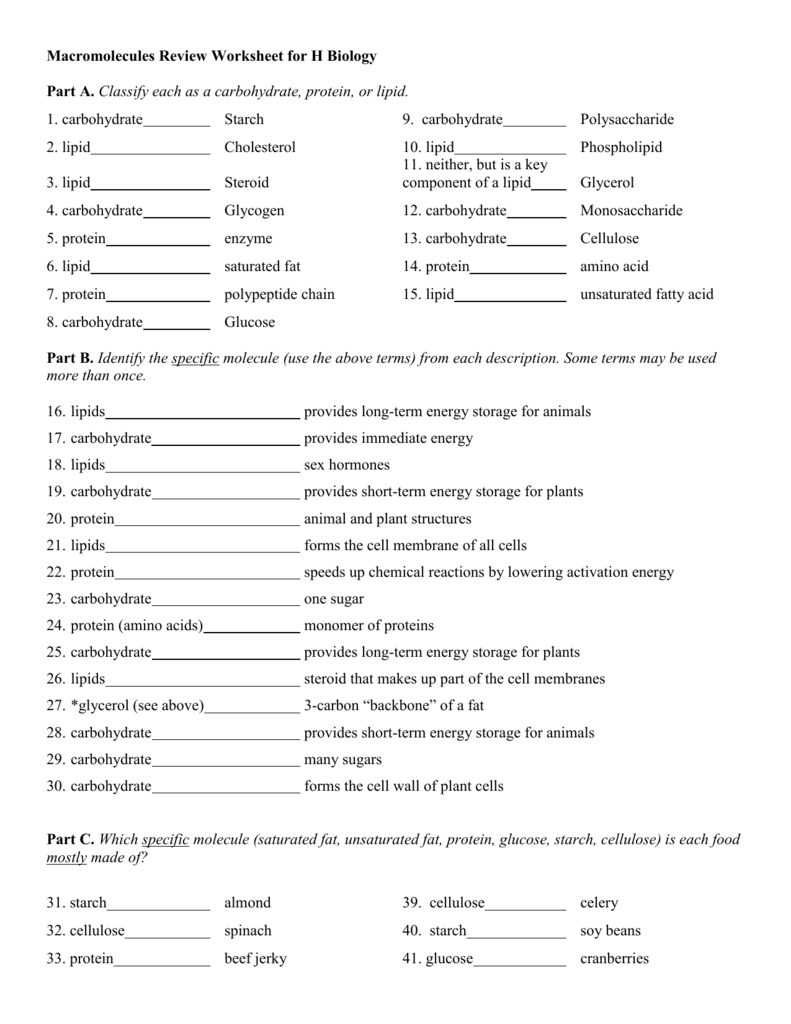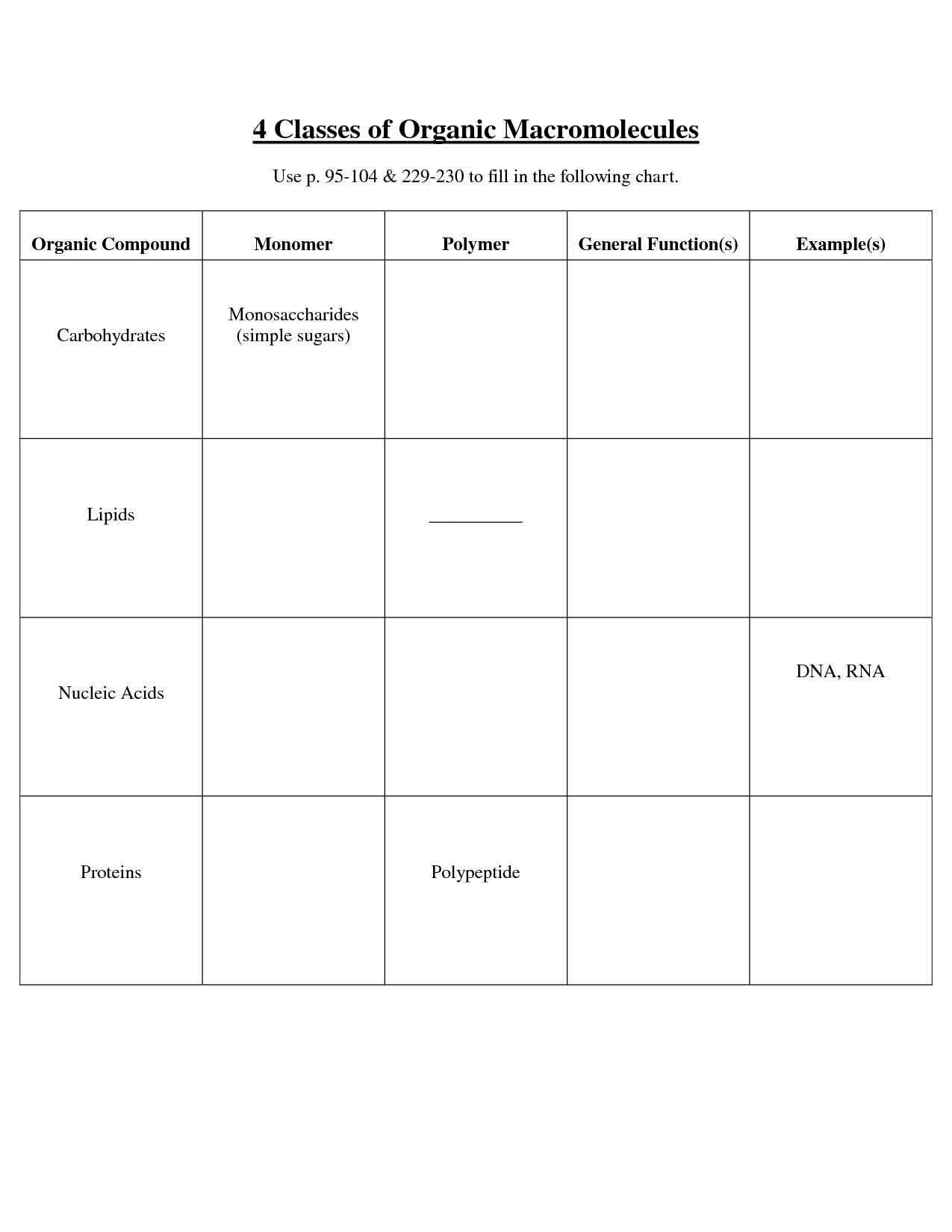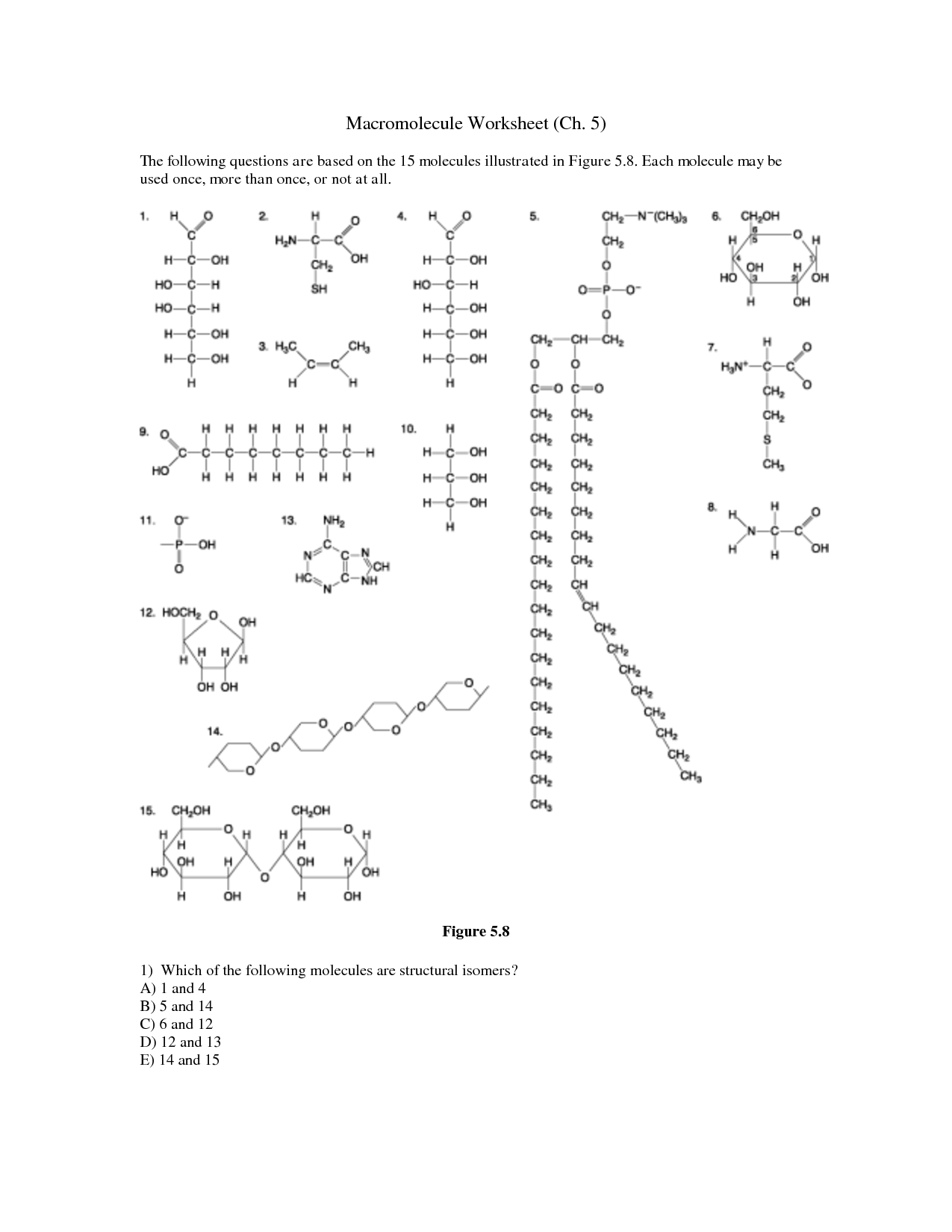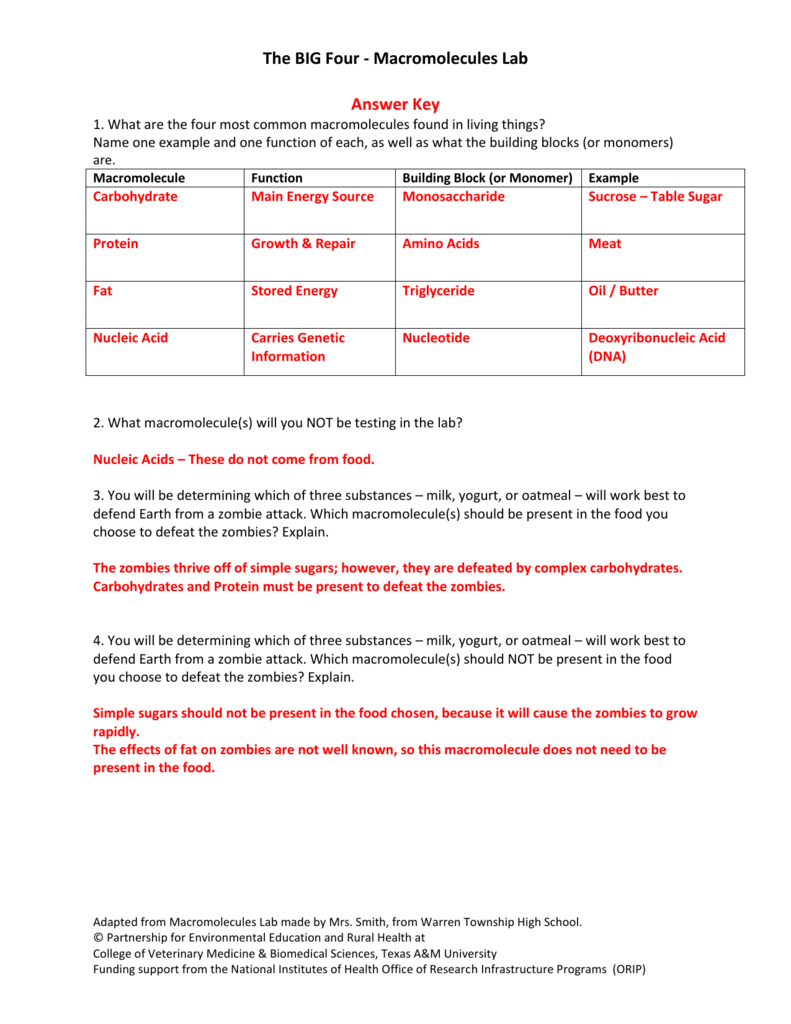Macromolecules Of Living Things Worksheet Answers
Macromolecules Of Living Things Worksheet Answers - There are four categories of. They are life‟s building blocks. Carbohydrates, lipids, proteins, and nucleic acids. Web molecule called a macromolecule. Web organic molecules are the molecules which exist in all living things. There are four categories of organic molecules: There are four classes of macromolecules that constitute all living matter: Web most living things are mainly composed of different combinations of the same five elements. Web study with quizlet and memorize flashcards containing terms like macromolecules that act as waterproofing molecules, macromolecule that is the polymer of amino acids,. Identify the structure and function of the four major organic macromolecules found in living things. Identify the structure and function of the four major organic macromolecules found in living things. Web there are four classes of macromolecules that constitute all living matter: Web study with quizlet and memorize flashcards containing terms like macromolecules that act as waterproofing molecules, macromolecule that is the polymer of amino acids,. There are four classes of macromolecules (polysaccharides or carbohydrates,. Some of the worksheets for this concept are biology macromolecules work and. Explain the relationship between monomers and polymers and explain how these molecules are related to the “unity and diversity of life.”. There are four classes of macromolecules (polysaccharides or carbohydrates, triglycerides or lipids, polypeptides or proteins, and. Cooperative teams build 3d cubes on lipids, carbohydrates,. Web organic molecules. There are four classes of macromolecules (polysaccharides or carbohydrates, triglycerides or lipids, polypeptides or proteins, and. Explain the relationship between monomers and polymers and explain how these molecules are related to the “unity and diversity of life.”. Web organic molecules are the molecules which exist in all living things. Web molecule called a macromolecule. Carbohydrates, lipids, proteins and nucleic acids. Web most living things are mainly composed of different combinations of the same five elements. They are life‟s building blocks. All things are formed from these organic molecules. Web organic molecules are the molecules which exist in all living things. Web molecule called a macromolecule. Carbohydrates, lipids, proteins, and nucleic acids. Be able to identify and explain the 5 characteristics of living things. Some of the worksheets for this concept are biology macromolecules work and. These elements are carbon, oxygen, hydrogen, nitrogen and phosphorus (mainly. Web [get] macromolecules of living things worksheet answers | updated! See what your students know about proteins, lipids, carbohydrates, and nucleic acids. Web organic molecules are the molecules which exist in all living things. Web molecule called a macromolecule. There are four classes of macromolecules (polysaccharides or carbohydrates, triglycerides or lipids, polypeptides or proteins, and. Web [get] macromolecules of living things worksheet answers | updated! There are four classes of macromolecules (polysaccharides or carbohydrates, triglycerides or lipids, polypeptides or proteins, and. These elements are carbon, oxygen, hydrogen, nitrogen and phosphorus (mainly. Identify the structure and function of the four major organic macromolecules found in living things. There are four classes of macromolecules that constitute all living matter: See what your students know about proteins, lipids,. Explain the relationship between monomers and polymers and explain how these molecules are related to the “unity and diversity of life.”. Carbohydrates, lipids, proteins, and nucleic acids. Web [get] macromolecules of living things worksheet answers | updated! Some of the worksheets for this concept are biology macromolecules work and. Identify the structure and function of the four major organic macromolecules. Web [get] macromolecules of living things worksheet answers | updated! Web most living things are mainly composed of different combinations of the same five elements. There are four categories of. They are life‟s building blocks. Web organic molecules are the molecules which exist in all living things. They are life‟s building blocks. Web molecule called a macromolecule. These elements are carbon, oxygen, hydrogen, nitrogen and phosphorus (mainly. Explain the relationship between monomers and polymers and explain how these molecules are related to the “unity and diversity of life.”. Identify the structure and function of the four major organic macromolecules found in living things. All things are formed from these organic molecules. Web there are four classes of macromolecules that constitute all living matter: See what your students know about proteins, lipids, carbohydrates, and nucleic acids. Web molecule called a macromolecule. There are four categories of organic molecules: Explain the relationship between monomers and polymers and explain how these molecules are related to the “unity and diversity of life.”. There are four classes of macromolecules (polysaccharides or carbohydrates, triglycerides or lipids, polypeptides or proteins, and. Web most living things are mainly composed of different combinations of the same five elements. Carbohydrates, lipids, proteins, and nucleic acids. These elements are carbon, oxygen, hydrogen, nitrogen and phosphorus (mainly. Web organic molecules are the molecules which exist in all living things. All things are formed from these organic molecules. Cooperative teams build 3d cubes on lipids, carbohydrates,. Be able to identify the hierarchical levels of organization of life from molecules and atoms to. There are four categories of. Web macromolecules of living things worksheet for review or assessment. Web [get] macromolecules of living things worksheet answers | updated! While they have different structures and functions,. Some of the worksheets for this concept are biology macromolecules work and. They are life‟s building blocks. While they have different structures and functions,. They are life‟s building blocks. Explain the relationship between monomers and polymers and explain how these molecules are related to the “unity and diversity of life.”. Web most living things are mainly composed of different combinations of the same five elements. Some of the worksheets for this concept are biology macromolecules work and. Web there are four classes of macromolecules that constitute all living matter: Web molecule called a macromolecule. There are four classes of macromolecules (polysaccharides or carbohydrates, triglycerides or lipids, polypeptides or proteins, and. There are four classes of macromolecules that constitute all living matter: Be able to identify the hierarchical levels of organization of life from molecules and atoms to. Web [get] macromolecules of living things worksheet answers | updated! All things are formed from these organic molecules. Web organic molecules are the molecules which exist in all living things. Web study with quizlet and memorize flashcards containing terms like macromolecules that act as waterproofing molecules, macromolecule that is the polymer of amino acids,. There are four categories of organic molecules: There are four categories of.Macromolecules Worksheet Answers Key kidsworksheetfun
30 Macromolecules Worksheet Answer Key Education Template
Macromolecules Worksheet Answers —
Macromolecules Worksheet Answer Key —
13 Best Images of Macromolecule Worksheet Practice Nomenclature
Macromolecules Worksheet Answer Key Luxury Elements and Macromolecules
16 Best Images of Building Macromolecules Worksheet Answer D Elements
30 Macromolecules Worksheet Answer Key Education Template
Macromolecules Worksheet Answer Key Education Template
Building Macromolecules Worksheet Answers
Cooperative Teams Build 3D Cubes On Lipids, Carbohydrates,.
These Elements Are Carbon, Oxygen, Hydrogen, Nitrogen And Phosphorus (Mainly.
See What Your Students Know About Proteins, Lipids, Carbohydrates, And Nucleic Acids.
Carbohydrates, Lipids, Proteins, And Nucleic Acids.
Related Post:










